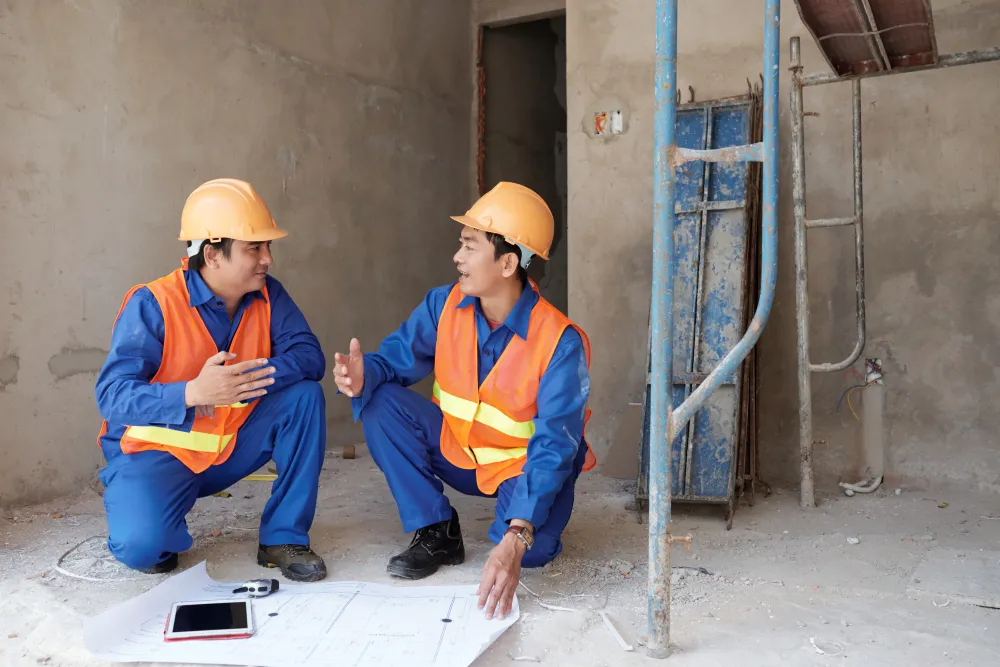Essential Construction Worker Skills That Actually Get You Hired in 2025
Look, I'm going to be straight with you. Construction isn't just about showing up with a hard hat and swinging a hammer anymore. Sure, those basics still matter, but the construction worker skills employers actually want have changed faster than most people realize. With over 430,000 construction job openings right now and companies desperate for skilled workers, knowing the right skills can be the difference between getting stuck in entry-level positions forever or building a career that actually pays the bills.
The construction industry is growing at 10% annually, making it the fourth-fastest growing sector in America. But here's the catch – most workers don't know which skills employers actually value. Whether you're thinking about getting into construction or you've been swinging tools for years but want to level up, we're covering the essential construction worker skills that matter in 2025.
Skills That Are Red-Hot in Demand Right Now
Technology Integration Skills
Here's something that might surprise you: workers with basic tech construction worker skills are getting paid 15-20% more than those who don't. We're talking about understanding the digital tools that are now standard on most job sites.
Most in-demand tech skills:
• Building Information Modeling (BIM) software - reading 3D models and spotting conflicts
• Project management platforms like Procore and PlanGrid for progress tracking
• Drone operation for site inspections and safety monitoring
• AR/VR systems for design visualization
Workers who can navigate these systems are ahead of 70% of other applicants.

Green Building and Sustainability
Sustainability skills are commanding premium wages as federal and state incentives push green construction.
Key green building competencies:
• LEED certification knowledge and green material understanding
• Renewable energy systems (solar, energy-efficient HVAC)
• Environmental compliance and waste reduction practices
• Sustainable construction methods and materials
Advanced Safety and Compliance
Digital safety reporting, advanced hazard recognition, and updated OSHA standards are creating new opportunities for workers with current safety expertise.
Specialized Trade Skills by Construction Sector
Different construction sectors require different expertise. Here's what employers are looking for:
Residential Construction
Key residential skills:
• Framing and structural work with modern techniques
• Finishing work (drywall, flooring, tile, painting)
• Multiple trade capabilities (basic electrical, plumbing knowledge)
• Customer interaction and quality craftsmanship standards
Commercial and Industrial Construction
Heavy equipment operation and understanding maintenance, safety protocols, and efficiency optimization makes you irreplaceable.
Commercial construction essentials:
• Concrete and masonry work for large-scale projects
• Reading complex commercial blueprints and specifications
• Working with structural steel and precast elements
• Understanding commercial building systems
Infrastructure and Highway Construction
Specialized infrastructure work demands:
• Road building, paving, and grading expertise
• Bridge and tunnel construction techniques
• Traffic control and safety in active roadways
• Understanding of drainage systems and utilities
Physical and Technical Foundation Skills
Core Physical Requirements
Construction demands specific physical abilities. You need to lift 50+ pounds regularly, stand for 8-10 hours, work in all weather conditions, and maintain coordination while using tools and equipment.
Key physical skills needed:
• Hand-eye coordination for precise work with tools and small components
• Visual and spatial skills for reading blueprints and understanding 3D relationships
• Stamina for long workdays in challenging conditions
• Flexibility to work in tight spaces and various positions
Hand-Eye Coordination and Dexterity Whether installing electrical components, laying tile, or operating equipment controls, precise hand movements and good coordination are essential.
Tool Proficiency and Equipment Knowledge
Essential expertise includes understanding when to use which tool, how to maintain equipment, and troubleshooting when tools aren't working properly.
Essential tool skills:
• Proper selection and maintenance of hand and power tools
• Heavy equipment operation and basic troubleshooting
• Safety equipment protocols and PPE compliance
• Understanding equipment capabilities and limitations

Mathematical and Literacy Skills
Essential Math Skills
Construction math requires precision and understanding of practical applications.
Core math competencies:
• Measurement and calculation (reading tape measures, calculating materials)
• Blueprint reading and understanding dimensions
• Material estimation and waste calculation
• Basic geometry for angles and slopes
Measurement and Calculation Reading tape measures accurately, calculating material quantities, understanding angles and slopes, and making adjustments based on field conditions. Getting measurements wrong costs money and time.
Communication and Documentation
Written Communication Construction requires more writing than people expect. Daily reports, incident documentation, material requests, and communication with supervisors all require clear writing abilities.
Verbal Communication and Teamwork Poor communication causes 48% of construction rework. Being able to clearly communicate problems, ask questions, and coordinate with team members is essential for project success.
Technology and Digital Skills
Construction-Specific Software
Modern construction sites run on digital platforms. These essential construction worker skills keep projects moving efficiently.
Key digital competencies:
• Project management systems for tracking and reporting
• Digital measurement tools (laser levels, GPS systems)
• Mobile apps for time tracking and safety checklists
• Basic understanding of 3D modeling and visualization tools
Being comfortable with smartphone and tablet technology is no longer optional.
Emerging Technologies
3D Modeling and Visualization While you won't create 3D models, being able to read and understand them helps prevent costly mistakes.
IoT and Smart Building Systems Modern buildings include smart systems for HVAC, security, and energy management. Understanding these systems makes you valuable for both installation and maintenance work.
Safety and Compliance Skills
OSHA Standards and Regulations
Current Safety Requirements OSHA standards evolve regularly. Workers who stay current with requirements and implement them effectively become safety leaders and supervisors.
Essential safety knowledge areas:
• Hazard recognition and prevention techniques
• Proper incident response and digital documentation
• Personal protective equipment (PPE) requirements
• Site-specific safety protocols and emergency procedures
Hazard Recognition and Prevention Being able to identify potential hazards before they cause problems and knowing when to stop work for safety reasons protects everyone on site.
Environmental and Health Considerations
Hazardous Material Handling Many construction materials involve hazardous substances. Understanding proper handling, storage, and disposal procedures is both a safety requirement and valuable expertise.
Air Quality and Respiratory Protection Knowing when and how to use respirators, understanding air quality concerns, and working safely in environments with dust, chemicals, or limited ventilation.
Soft Skills and Leadership Qualities
Communication and Teamwork
Construction projects involve constant problem-solving with multiple people. These soft abilities make you valuable to any crew.
Critical soft skills for success:
• Clear communication with diverse teams and supervisors
• Conflict resolution and maintaining team focus
• Adaptability to changing project requirements
• Time management and organizational skills
Conflict Resolution When people work closely together under stress, conflicts happen. Workers who can defuse tensions and keep teams focused on work are natural leaders.
Leadership and Management Potential
Crew Coordination Understanding how to organize work, coordinate with other trades, and keep projects moving efficiently. These abilities lead to foreman and supervisor roles.
Leadership qualities that get noticed:
• Training and mentoring new workers effectively
• Quality control and maintaining high standards
• Cross-training in multiple trades for versatility
• Technology adoption and willingness to learn new systems
Career Advancement and Continuous Learning
Certification and Training Programs
Industry-Recognized Certifications OSHA 10 and 30-hour certifications, NCCER credentials, and trade-specific certifications boost your credibility and earning potential. Many employers now require these as minimum qualifications.
Top certifications for advancing your expertise:
• OSHA safety certifications (10/30-hour)
• NCCER craft training and assessment programs
• Trade-specific licenses (electrical, plumbing, HVAC)
• LEED Green Associate for sustainable construction
Apprenticeship Programs Union and non-union apprenticeships provide structured learning paths with increasing wages as you develop abilities.
Professional Development Strategies
Industry Involvement Joining trade associations, attending industry events, and networking with other professionals provides opportunities for career advancement.
Documentation and Portfolio Development Keeping records of projects you've worked on, certifications earned, and construction worker skills developed helps when applying for better positions.
Long-Term Career Planning Understanding regional differences in construction markets, wage levels, and project types helps you make informed decisions about where to work and which abilities to prioritize.
Frequently Asked Questions
Q. What skills do you need to start in construction with no experience?
A. Basic requirements to get started:
• Good work ethic and willingness to learn
• Physical capability for manual labor
• Basic math skills and ability to follow instructions
• Reliable transportation
Most importantly, show up on time every day and be willing to start at the bottom while learning.
Q. How much can construction workers make with the right skills?
A. Entry-level: $15-18/hour
Skilled workers: $25-40/hour
Specialized trades: $30-50/hour (electricians, plumbers, crane operators)
Supervisory roles: $60,000-100,000+ annually
Q. Are construction jobs physically demanding?
A. Yes, but it varies by role. You'll lift heavy materials, work in all weather, and be on your feet for long periods. Modern equipment has reduced some physical demands, and many positions now involve more technical skills than pure manual labor.
What certifications are most valuable for construction workers?
Essential certifications:
• OSHA 10 or 30-hour (virtually required)
• Trade-specific licenses (electrical, plumbing, HVAC)
• Equipment operation (crane, forklift)
• LEED Green Associate (growing demand)
How important are soft skills in construction?
Extremely important. Communication problems cause nearly half of all construction rework. Workers with good teamwork, problem-solving, and leadership skills advance faster and earn more.
Can you learn construction skills online?
Partially. You can learn blueprint reading, safety training, and construction technology online through platforms like Coursera and trade schools. However, hands-on skills require apprenticeships or on-the-job training.
What's the difference between union and non-union construction work?
Union: Higher wages, better benefits, structured training, but more rigid rules
Non-union: More variety, faster advancement, direct employer relationships, but variable benefits
Both paths can lead to successful careers.
How is technology changing construction work?
Technology creates opportunities for adaptable workers. Digital project management, BIM modeling, and drone surveys are becoming standard. Workers who embrace tech earn more, but traditional hands-on skills remain essential.
What should I look for in a construction employer?
Red flags vs. green flags:
• Training investment and advancement opportunities
• Good safety records and modern equipment
• Health insurance and retirement benefits
• Focus on long-term development, not just immediate wages
How can FlexCrew USA help with my construction career?
FlexCrew USA connects skilled workers with quality employers nationwide. We match your skills with positions offering growth opportunities, competitive wages, and good working conditions based on your experience level and career goals.
Ready to Put Your Construction Skills to Work?
The construction industry offers real opportunities for workers with the right skills and work ethic. Whether you're just starting out or looking to take your career to the next level, FlexCrew USA can help connect you with employers who value skilled, reliable workers.
Contact FlexCrew USA today to discuss your construction career goals and find opportunities that match your skills and ambitions. We're here to help you build a career, not just find a job.
